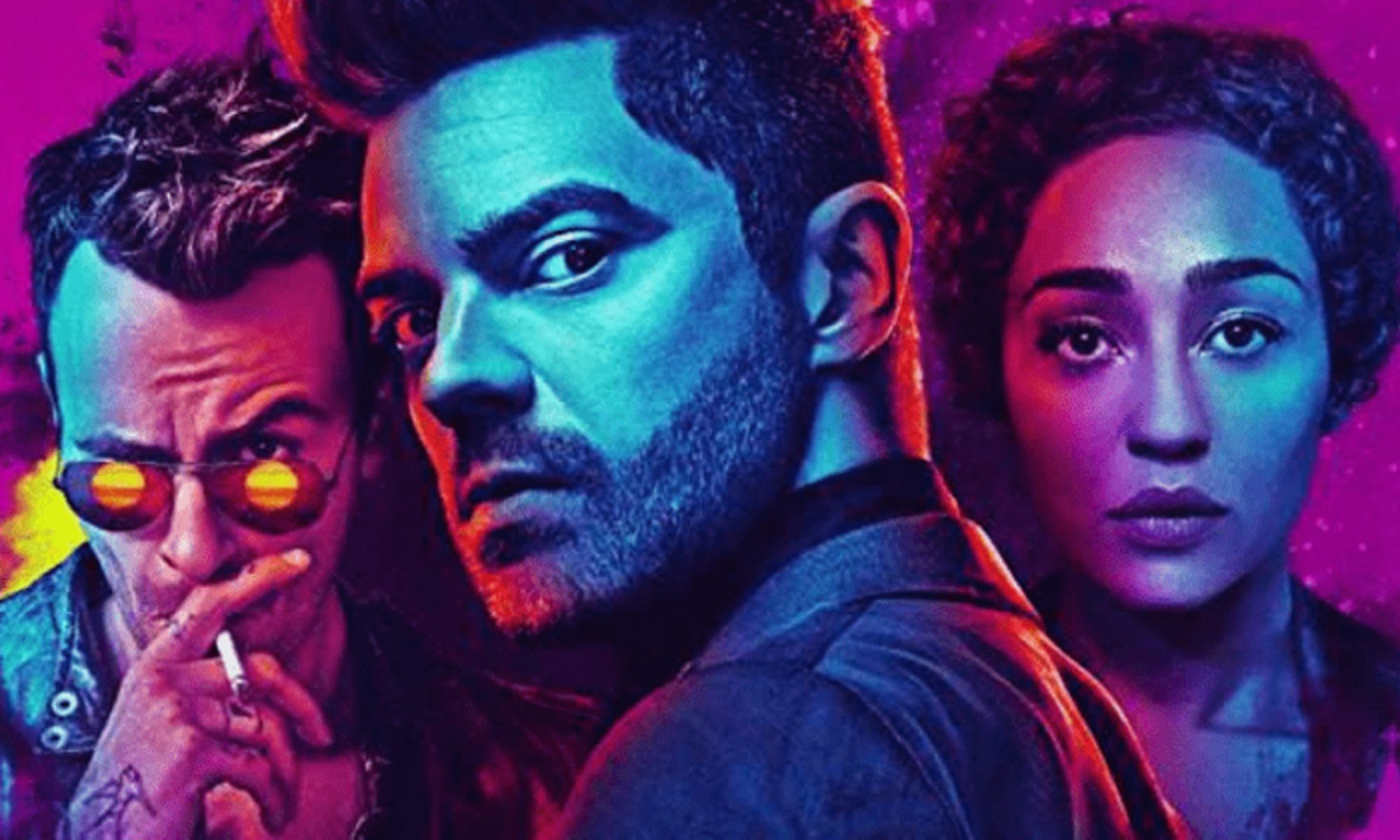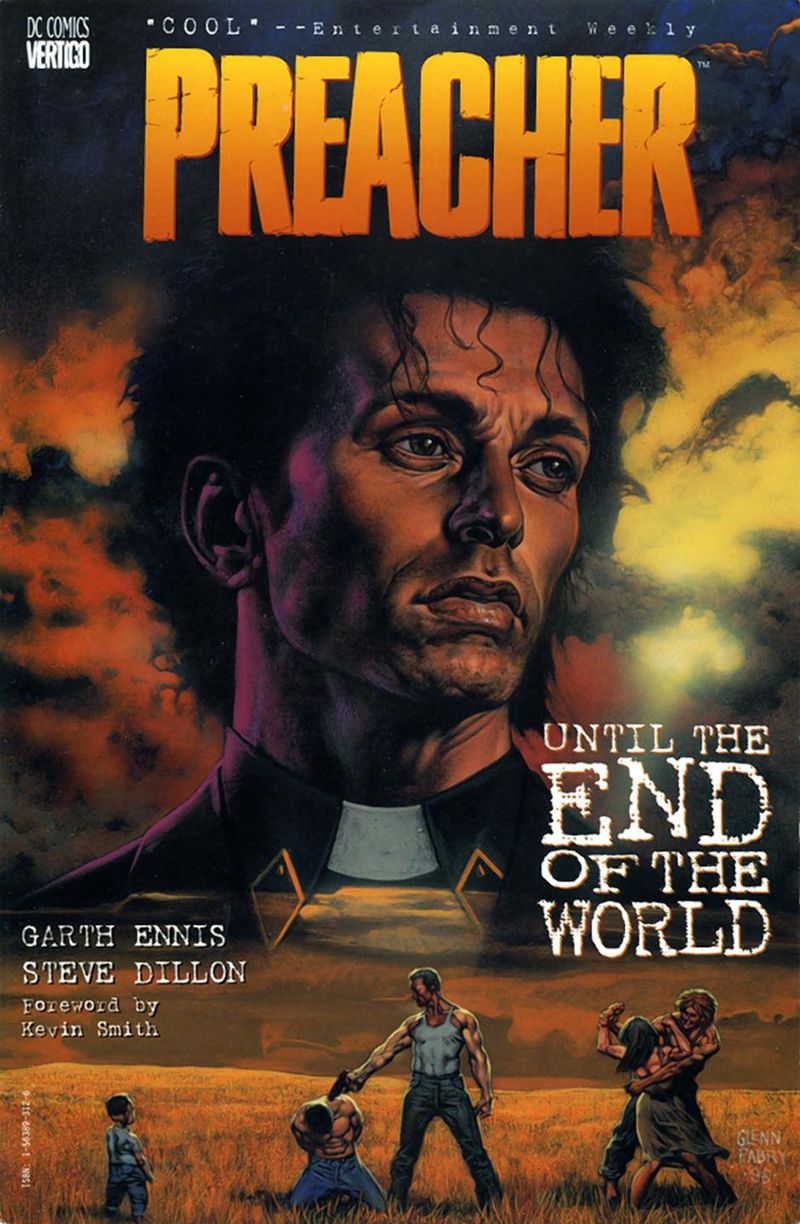
You read that Preacher comic? If you have, I bet you got a story about it. It’s one of those where sometimes the story you read is only the beginning, the real interesting part is what the story does to you, how it takes root and changes you in ways you don’t even fully realize for years.
The original Garth Ennis/Steve Dillon series launched in 1995, a critical juncture for the still quite young Vertigo banner when DC had just made the commendable call to allow Neil Gaiman to lay his Sandman series to rest at the natural conclusion of his story right when old Grant Morrison was accelerating his insane metafictional narrative The Invisibles out into interdimensional space and beyond. As it careened toward the end of the century, Vertigo was only a couple years old but already well defined and beloved by fans as a place where comics really weren’t for kids anymore, and readers could get their hands on tales boiling over with more sex and violence and drug abuse and profanity than could be found in most R-rated movies of the day. Questionable life decisions on every page. For mature readers only. Superman would not be saving any cats from trees in here, but John Constantine was a devout and regularly practicing bisexual whose greatest nemesis was his interminable smoking habit putting him into an early grave unless he could outsmart the devil.
Into this fog, an Irishman and a Brit gave explosive birth to the most Vertigo Vertigo comic that perhaps ever was. Transgressive, shocking, filthy, and gratuitously hyperviolent, it told the story of a thirty-year-old preacher from Texas who gets possessed by the forbidden love child of an angel and a demon, which gives him a voice that compels anyone within earshot to do his bidding, so he decides to go track down God and hold him accountable for famine and cancer and earthquakes and dead babies and all the rest. His companions are his gun-toting no-bullshit ex-girlfriend and a 117-year-old Irish vampire. There was nothing like it on the stands. Hasn’t been since. And right here is where I confess that I’m not one of those diehards.
Preacher landed right at that jettison point where I moved out of my parents’ house and started finding my own way, still picked up a few back issues from time to time but quit buying new comics every week. My friends, the ones who bought Preacher every month it was released, they’re still wild for the series with scary eyes, rabid about it in that way you can only be when you love something so much it makes your stomach hurt just waiting for the next installment, in a way that people who sit down and read an entire trade paperback in one sitting years later will never be able to fathom. So, I’m not on those folks’ level; let’s just get that out of the way. But when I did sit down years later to read the trade paperbacks in one sitting, I loved it so much I started trying to handle myself around people more the way Jesse Custer did. I quit drinking Shiner Bock and began a passionate romance with Lone Star beer that has lasted to this day and never shall we part.
When I heard that Elijah Wood got the part of Frodo Baggins by climbing up in a tree one day, filming himself reciting Tolkien dialogue, and mailing that off to Peter Jackson, I pounded a couple shots of Jack and a few Stars, put on an eyepatch, and filmed myself with my giant tank early 2000s cell phone talking about how a man was only worth how well he kept his word to his friends and that John Wayne was the greatest damn cowboy who ever lived, and by the way, Fuck communism, Pilgrim. All these years later, when AMC announced that Dominic Cooper was cast as Jesse, a little part of me died, even though of course I had no acting experience or industry connections. I knew how to drink Lone Star in Texas and not to take bullshit from anyone, by God. That was enough.
The weird thing that Sam Catlin & Seth Rogen, huge fans of the comic themselves, did with their televisual adaptation, is that they took the seventh volume of a nine-volume series and crammed that arc into one scene from #1 of the comic book, and then turned that into a ten-episode basically prequel, so that all the madmen who loved the series were so furious about it not being anywhere close to a beat-for-beat adaptation, they had all gone snarling into the hills by the time the jaw-dropping eighth episode landed, adapting the The Saint of Killers spinoff mini-series to absolutely staggering perfection.
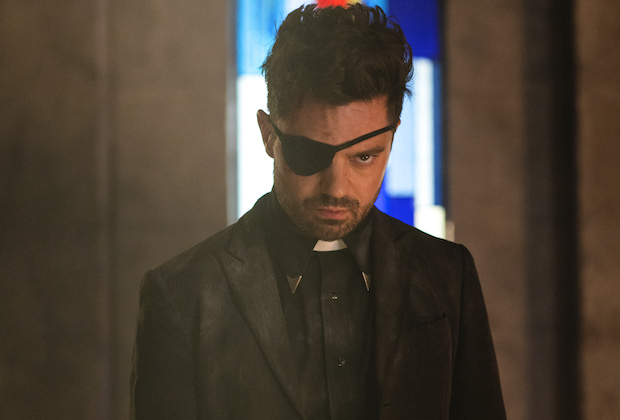
I’ve never seen the numbers, but I feel like this show never figured out how to find its natural audience. It was so horrifying and profane, most random people just tuning in were turned off, but its story beats were at first so different, it enraged the built-in fan base. But over time, it became very obvious that the show was actually heading to the same place as the hallowed series, it was just going to figure out how to get there all by itself.
And but I tell you what, three weeks ago — the first time I caught a little mention of the Alamo up in God’s RV — I said to myself, “Ah, hell,” and sure enough had to power through the entire nine volumes as fast as I could to make it all the way through before the series finale Sunday night. It had been maybe 15 years since my last pass, and I truly forgot some of the moments that they lifted verbatim from the source material. Most of the stuff that got jettisoned, like Si the serial killer or the San Francisco sex detectives, I really didn’t miss, but I almost forgot about the raid on Jesus de Sade’s place and how the New Orleans vampire coven plot was from a Cassidy one-shot, or even major stuff like Jesse falling out of the plane. The Jody/TC plot escalation in Season Three hit me as hard as the unforgettable Volume 2 of the series. Jeremy Childs as Jody was as menacing an antagonist as I can recall seeing on the small screen.
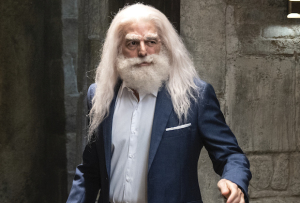
I tuned into the final season premiere with high hopes and was immediately rewarded with Mark Harelik as God, channeling Cecil B. DeMille Biblical glory and wrath. While this series has taken some liberties with the throughline of Ennis & Dillon’s original effort, it’s always kept its fist wrapped around the original’s still-beating heart and channeled the tone of everything they accomplished. It’s loud and brash and stupid and far too violent and cool and ugly and hilarious and the saddest damn thing, all within the space of five minutes and one too many jump cuts. You could argue that I did the television show a disservice because I cracked open my first Star of the evening and read Preacher #66 right before turning on the finale, so I had that original perfect glorious ending right there in the front of my head, which ought to be the kiss of death for any one adapter who thinks they can improve on the original. And you know what? You ought to go ahead and watch the finale first. I’m going to tell you my favorite things about it that Sam Catlin and friends made up all on their own but that threw me back and forth my living room, reeling with vertigo:
-The look in Cassidy’s eyes when he told Tulip that if she did that again, he would kill her. From his opening scene in the pilot on that plane, Joe Gilgun has 100% brought to life one of the most beloved supporting characters of all time with more rougish charm and wit and depravity than anyone ever had the right to expect off the page. And I adore Ruth Negga as Tulip. These two have done so much heavy lifting throughout the series, but never more than this season.
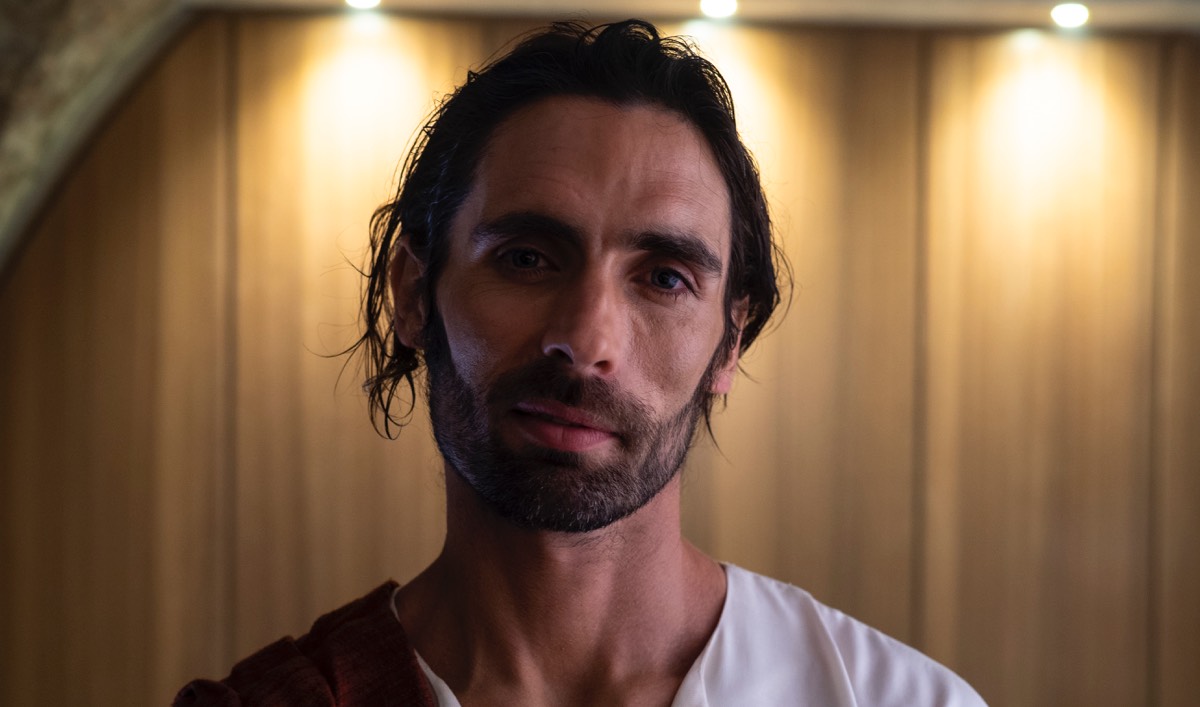
–Jesus Christ vs. Adolf Hitler. A knockdown dragout to the death. There are several incredible, incredible fights in this episode choreographed by some deranged genius and depicted through riveting split-screen by Catlin, but we keep cutting back to this fight for at least the first half of the entire damn episode, and it is the funniest and most ridiculous and wonderful thing. When Jesus suddenly revealed his ability to fly in order to bodyslam Hitler was when I started hollering out into the night.
–Tyson Ritter in general, now and forever, Amen. And purists be damned, but this show took a really pretty cheap joke that only at all landed because it was so deeply offensive (“Hey kids, Jesus’s many-times-great-grandson is the result of 27 generations of inbreeding and he’s reeeeeeeally retarded. And he throws his own poop!”) and crafted a character remaining true to this set-up but somehow engendering profound empathy and just resonating with pathos. God, just the thought of his face actually gets me choked up now. How did they do that? What they accomplished with Humperdoo over the course of this series is actually an entire essay for another time and was a stunning deal, but then when Ritter suddenly started pulling double-duty and showed up as actual Jesus Christ himself earlier this season, it was, murder me, a revelation.

-Okay, really, all the supporting characters. Julie Ann Emery’s Featherstone is a distinct improvement upon the somewhat flat original, and Ian Colletti plays Eugene “Arseface” Root with much more heart than the comic-book version was ever given, a guy whose major distinguishing characteristic was that whacked-out phonetic dialogue Ennis quit captioning in the back-end, there. And Pip Torrens does as much for Herr Starr as Gilgun does for Cassidy. And that last shot of Graham McTavish was more instantly iconic and devastating than anything that the Home Box Office managed in the month of May. You know you were thinking it. The entire bench just knocking it out of the park all the way down the line. I know there are many many fans of the comic who just hate the show, and they’re certainly entitled to their opinion, but they gave up too early before it found its legs in the second season. All of the ensemble character work is an absolute slam-dunk and profoundly in the spirit of the source material.
–God at The Alamo. As much as I love the original series, it always felt a bit off how much the last arc suddenly swerves over into Jesse vs. Cassidy for the heart of Tulip. I prefer the show’s take on that dynamic: Jesse just shrugging off the affair at the top of last week’s episode and then back to business. Jesse sitting down with God here — instead of Cassidy having the last word with him — is a more traditionally satisfying resolution to the entire long arc of the show than even what Ennis & Dillon managed. I always suspected that that was sort of the point, a bait-and-switch away from the prototypical protagonist/antagonist conflict resolution, but this one sits better with me.
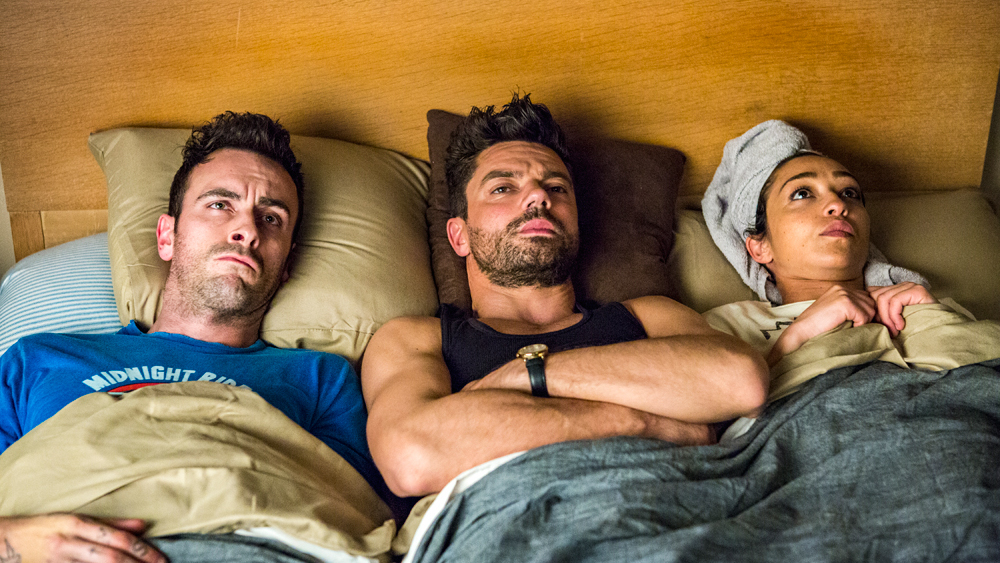
–Sam Catlin’s writing and direction. Going back through and reading the original with eyes that are fifteen years better at picking out the nuances of facial expressions and body language and panel-staging substantially increased the already massive respect I had for Steve Dillon. No one else in the world could have made Preacher the comic what it was and brought Ennis’s conversations, allllllll those conversations about the measure of a good man and the importance of honesty in true love and friendship and What America Means and all that, oh God I just realized, preaching. But jumping mediums necessitated adding more freneticism and mayhem into the mix, and from the very beginning, Catlin (who, remember, co-wrote “Fly,” one of Breaking Bad’s finest episodes) did amazing work carving out a visual language that’s unique unto itself while still remaining true to what Ennis & Dillon created twenty-five years ago, three unlikely companions who went screaming down the highway to achieve the absurd impossible and left us all choking in their dust, laughing and scarred and grateful for the experience, the adventure, it was the time of the preacher and it was a hell of a vision.

-Rob Bass

